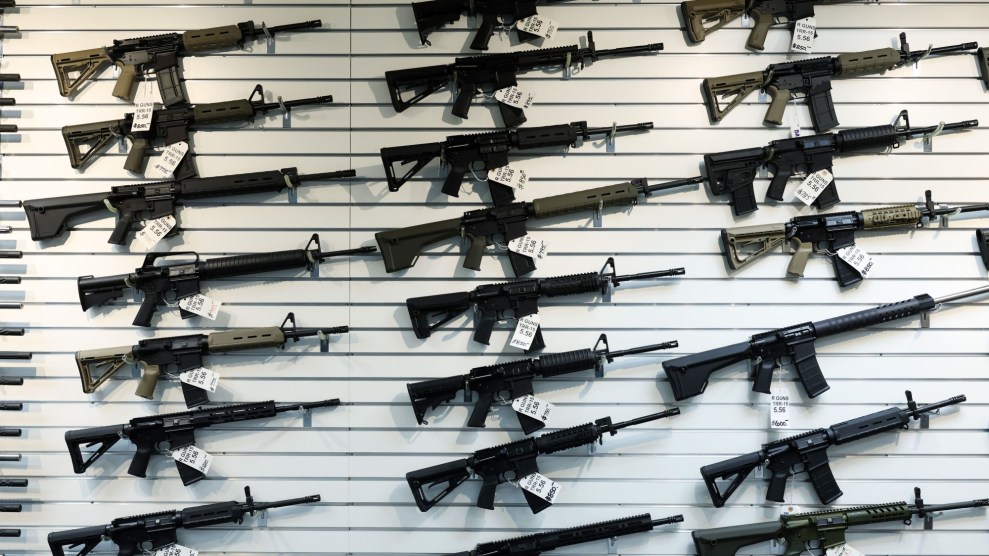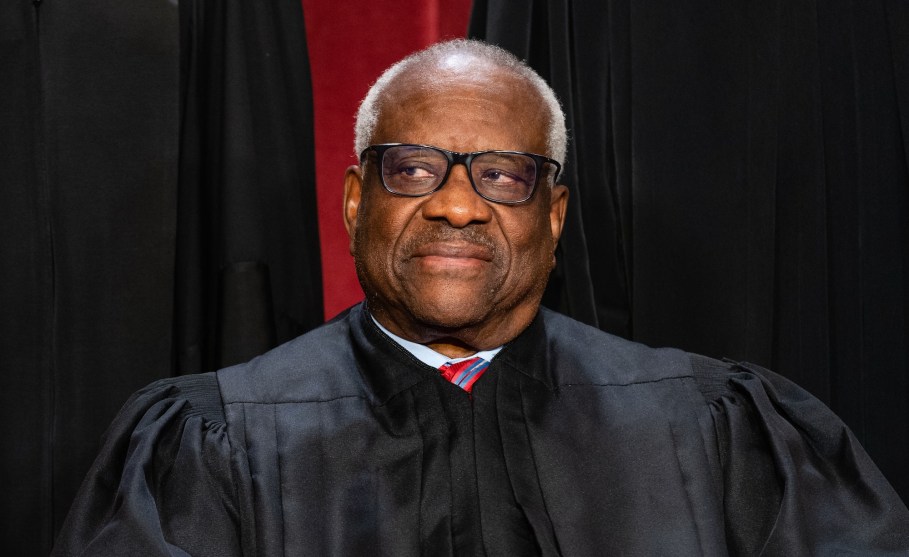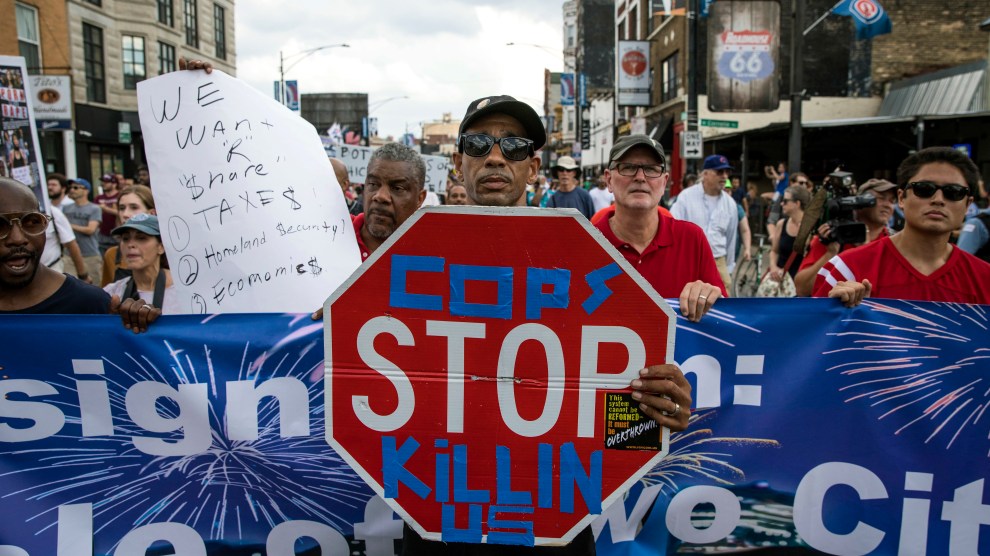
Mother Jones illustration; Getty
It took seven long years to pry one staggering number from the hands of the federal government: that 52,529 weapons once owned by police were recovered at crime scenes across the country from 2006 to 2021. In that period, an average of nine cop guns were recovered each day. The public didn’t know it.
This statistic was the missing piece in a yearslong reporting effort by Reveal, the Trace, and CBS News into how weapons sold by police departments were getting into the hands of criminals. Reveal first sought this information through the Freedom of Information Act (FOIA)—the keystone law centered on government transparency. But it wouldn’t be that easy. As Reveal’s court battles demonstrate, there is resistance to such transparency.
These types of legal battles over FOIA requests are becoming more commonplace. According to a 2020 study by the FOIA Project, a Syracuse University-based research effort, media outlets filed more FOIA lawsuits to disclose government records during Donald Trump’s four-year presidential term than in the 16 years spanning Barack Obama and George W. Bush’s administrations.
The origins of the police weapons FOIA case date back to 2008, when Alain Stephens, then a police recruit, purchased a Glock handgun in a Texas parking lot that turned out to have come from a New Jersey police department. It got him thinking: How often do police guns end up in the hands of criminals? This question grew into a larger project once Stephens became a reporter and started the fight for this number as a fellow at Reveal. After his FOIA request was denied based on an argument that firearms trace data is confidential, the Reveal legal team sued—but it took seven years to claim victory.
Five of those years were court battles that rose all the way to the 9th US Circuit Court of Appeals. The case stalled further after another federal court interpreted the exemption differently and generated an opposing precedent, creating uncertainty.
The last two years were spent waiting for the Bureau of Alcohol, Tobacco, Firearms, and Explosives to cough up that one statistic. Armed with that number—52,529 former law enforcement weapons recovered at crime scenes—teams at the Trace, CBS News, and Reveal found that many of these guns had been traded in or sold back to gun manufacturers, a cost-saving measure that has sent thousands of guns back onto the streets to be used in violent crimes.
I spoke with D. Victoria Baranetsky—general counsel for the Center for Investigative Reporting (CIR), which houses Mother Jones and Reveal—about the battle over transparency on cop guns and the state of FOIA today. She’s led several other FOIA lawsuits for Reveal that have forced more transparency from the federal government: The rate of worker injuries at Amazon warehouses and most other American employers is no longer confidential, and the government now has to disclose the diversity of contractors it hires. She recently filed a case against OpenAI and Microsoft for using CIR’s content without permission or compensation.
This interview has been edited for clarity and condensed.
How did this case with the ATF start?
It started with Alain [Stephens] calling me up and being like, “Does this law say what I think it says?”
Alain was explaining to me that he was trying to get data from the ATF, but he was denied. There was this statute called the Tiahrt Amendment that did not allow for gun data to be disclosed. But there were exceptions—and the third exception under the law was for statistical aggregate data.
And he said, “I’m asking for just the number of guns that law enforcement have given back and put back into the marketplace.” And I said, “Yeah, I think that’s statistical aggregate data.”
So we sued.
What arguments did the ATF give for withholding data about police guns used in crimes?
They were saying that that exception was not meant for reporters. It was meant for only law enforcement and other folks that were supposed to be getting access to this data, not the general public.
And then there was a whole new issue entirely. They said that making them search for this number through their database would be the creation of a new record, and agencies are not required to create new records. They’re only required to produce what they have. And so they said, “Listen, you make us plug in this analysis and spew out a number for you, that’s going to be a new record that wouldn’t have existed prior, and so we’re not obligated to disclose this.”
The court shut that down immediately.
That kind of analysis would essentially destroy all kinds of data searches that governments have in their capacity today, because we’re living in the modern world and databases are the way that information is held. So if you limited searching a database as the creation of a new record, you’d essentially cut off access to tons of information that the public should have the right to know.
Unfortunately, this is not the only case where we have come across that argument.
So has that become a new tactic of how the government tries to restrict access to data?
Yes, it has worked in some locations. There’s a smattering of cases across the country leaning in either direction, but there’s no prevailing outcome yet as this is still being deliberated on across the country.
I think there’s also an even more disturbing reason for transparency today, which is more and more information is being created than ever before—and more is being collected than ever before by large corporate and government powers. There’s a massive imbalance as to who has access to that data; it’s all corporations and governments.
That is one of the reasons why this case was actually a huge win completely outside the realm of the ATF…this was something that would apply to all cases involving databases.
What does a seven-year FOIA legal battle look like?
A lot of emails.
This was actually the longest case I dealt with while I’ve been at this job. It’s just stages of a lot of intense work and then waiting. So writing the brief, which takes, like, three months, and you’re kind of in this tunnel vision of how to perfectly describe this argument to the court, and you submit it, you file it at midnight, and then you wait. You just wait for months and months and then get an argument date, and you prep for that for months and months. And then you wait.
Why is data transparency important for democracy?
In the United States, FOIA is actually one of the very few laws committed to transparency. And constitutionally, there are actually fewer and fewer protections for transparency.
There has been a sharp rise in the number of Exemption 3 statutes. Those are the statutes that Congress has been lobbied to pass to stop information from being disclosed under FOIA.
In fact, the Tiahrt Amendment, and the center of this case with Alain, was one of those statutes. The NRA [National Rifle Association] lobbied for that law to be passed, and I think they very intelligently did so, because I think its impact was actually huge. When you don’t have access to information, the public doesn’t really know what it thinks about an issue, because it can’t really get to the facts of the matter. So, I think, in general, facts help people make choices that can help them then make choices about who they elect into power.
But I think there’s also an even more disturbing reason for transparency today, which is more and more information is being created than ever before—and more is being collected than ever before by large corporate and government powers. There’s a massive imbalance as to who has access to that data; it’s all corporations and governments. For the public to not have a countervailing pressure or countervailing force to have access to that is deeply problematic. More and more decisions are having an impact in our life that corporations and governments are involved in, and they’re making those decisions based on data that we have no access to. If you have no access to that, there’s no accountability as to how those decisions are being made.
Reveal faced a SLAPP lawsuit in 2016 from Planet Aid that was eventually thrown out by a federal court in 2021. What does the legal battle with Planet Aid have in common with the lawsuit for gun trace data?
A SLAPP is a strategic lawsuit against public participation, something that’s supposed to quash First Amendment free speech activity. And anti-SLAPP statutes were created to quickly go into court. It’s not, theoretically, supposed to take more than a year or so at most. That [SLAPP] case went on for years—this incredible process of delay, delay, delay, eat up your resources, eat up your resources, eat up your resources, for something that was especially made to be answered quickly and efficiently. It dragged out for so long that it almost bankrupted our organization. You see tactics of this being used all over our system.
I think that’s the greatest parallel to this case with Alain. There’s no end in sight, right? Like, you filed a lawsuit. You go through seven years. You win. And then you still have to file another lawsuit to actually enforce it. To get to finality, it just takes too long now, much longer than it ever should have taken.
And there’s an added problem with FOIA where at some point, that information is stale. It doesn’t matter in the same way it would have mattered if it had been disclosed years prior.
Most smaller newsrooms and freelance journalists don’t have the luxury of legal support on staff like Mother Jones and Reveal do. Knowing that, what does this mean for journalism?
Most newsrooms, most journalists, most academics, protesters, citizens just don’t have the legal support to execute this. And that is really unfortunate and depressing. There was a paper written more than five years ago about how corporations are actually the ones that use FOIA the most to find out information about their competitors. So FOIA, drafted for the public and reporters, is not really being used by that sect of people. It’s being used often by corporate stakeholders who want to find information and that’ll give them a competitive advantage.
I still think [FOIA] does a lot, but I think the problem is how agencies choose to comply. The pressure put on them to comply is very minimal, and I think that greatly impacts journalism, because you know that if you actually did have access to this information, it would be helpful.
In looking at FOIAs, does the presidential administration make a difference in how they’re treated? Did you see differences between our fights under Trump and Biden’s administrations?
Honestly, I don’t think any administration is ever forthright in giving information. I think if you ask most people who live in the land of FOIA lawsuits, they’ll tell you that every administration kind of acts with a similarly hostile manner. The truth is power wants to hide problems. Power chooses to evade accountability, and that’s the whole point of FOIA. I think anyone who’s really in that position doesn’t necessarily want to share information. And our government, especially since 9/11, has just become a secrecy-obsessed state.
Thinking forward, what do you think the future holds for FOIA requests?
There are all these specific areas that are going under a lot of different splits or interpretations. One of them is about whether data searching a database is the production of a new record. That’s like one little spot. I think that there are a few other hot-button areas. One is like the exemption “Glomar,” where an agency gives the response, “Can’t confirm or deny that the records even exist.” Now we’re seeing that Glomar is applied even in cases where Glomar can’t be applied, or just the expansion of Glomar.
There was a decision that came out in 2019 that changed the test for what was confidential business information, which is exempt. And the Supreme Court changed it to be more friendly toward corporations. Previously, confidential business information was things that only would substantially hurt a corporation if disclosed—like you have an ingredient list for Coca-Cola. But the court changed it to whatever a company says is customarily or actually secret. As long as they give it a rubber stamp and say it’s so, it is so. I think that area of law already has had a lot of litigation, but that’ll be really interesting.
Transparency has actually always been a bipartisan issue. In some ways, all administrations hate it and all administrations love it because it equally hurts both sides or helps both sides. So that’s why legislation on FOIA has been able to pass over the past decade. That being said, the courts have been much more pro-corporate and pro-law enforcement in a way that I do worry will further stifle the charge of FOIA.

















